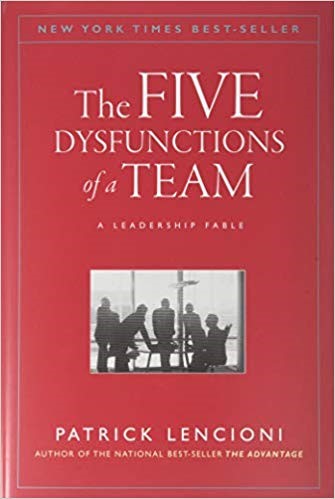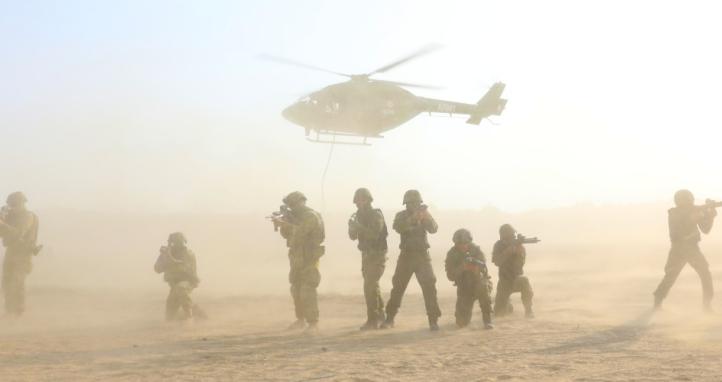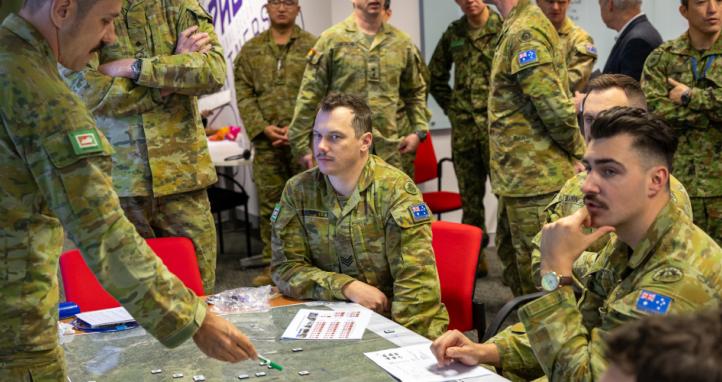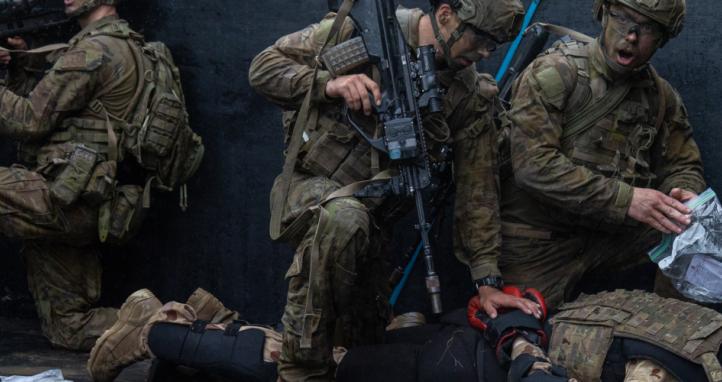Introduction
In December 2017, the then Commander United States Central Command (USCENTCOM), General (now-retired) Joseph Votel, published his 2018 Commander’s Reading List.[1] This list is an insight into an experienced senior leader’s thinking and intent. With only 12 titles, it is a relatively short list divided into five areas of study: leadership; managing complexity; strategy; understanding the CENTCOM area of responsibility; and, innovation.
The reading list was a beginning, not an end. General Votel’s intent for his staff was that we read, review, discuss and learn from each of the reading list books. With advanced warning before each discussion, the CENTCOM staff could focus on the topic and read with purpose. This format, a short reading list with follow-up collegiate discussions, enabled some of the most challenging and insightful professional military education experienced by this author.
This review essay, Part 1, provides observations on books related to leadership, managing complexity and strategy from General Votel’s 2018 Commander’s Reading List to enable options for readers should they seek to study a selection of these titles. In addition, this essay includes two additional books not originally selected by General Votel, but which complement his original intent.
Leadership
The Five Dysfunctions of a Team by Patrick Lencioni
- Dysfunction #1: Absence of Trust. Great teams are comfortable with sharing their weaknesses, fears and mistakes.
- Dysfunction #2: Fear of Conflict. Great teams enable passionate, questioning and respectful dialogue and consideration to enable decisions for organisational success.
- Dysfunction #3: Lack of Commitment. Great teams achieve genuine commitment to decisions, even when various members of the team initially disagree.
- Dysfunction #4: Avoidance of Accountability. Great teams do not hesitate to hold one another accountable for adhering to decisions, standards and ethics.
- Dysfunction #5: Inattention to Results. Great teams do not place their individual organisation, career aspirations or ego-driven status ahead of the collective results that define team success.

The Five Dysfunctions of a Team by Patrick Lencioni, 2002.
Hubris by Alistair Horne
- Hubris arises from success. In the aftermath of victory, anything seems possible. Victory is when, in our exuberance, calamitous decisions are made. Hubris is part of the human condition – deep-seated, lingering, pervasive and potentially lethal.
- The ancient Greeks defined hubris as the worst sin a leader, or a nation, could commit. Following the supreme arrogance of hubris, the Greeks defined peripeteia meaning a dramatic reversal of fortune; falling from the grace of a great height to unimaginable depths.
- Horne’s thesis is that ‘wars over the ages have generally been won or lost through excessive hubris, or complacency, on one side or the other…in modern parlance this might also be dubbed ‘overreach’.
- Wars studied in this book are limited to the first half of the twentieth century – the bloodiest in history and a century which could be called the century of hubris.
- The book is divided into five parts:
- Battle of Tsushima, the defeat of Russia at Port Arthur and the sinking of the Russian fleet by Japan, 1904-1905
- Battle of Nomonhan, Mongolia, the rise of Soviet power and General Georgy Zhukov defeating a Japanese force, 1939
- Battle of Moscow, German overreach and the first defeat and retreat of the apparently invincible Panzers, 1941
- Battle of Midway, Japanese overreach and a peripeteia in Japan’s imperial pretensions, 1942
- Korean War, hubristic American folly of not defining an end state or knowing when to stop, and Dien Bien Phu, Vietnam, the last of the old-fashioned colonial wars in the Far East and the defeat of France, 1950-1954
- Horne concludes with a vignette on the Six Day War, 1967, fought between Israel and its Arab neighbours and Israel’s ‘hubris and complacency, followed by its natural consequence peripeteia’, in the Yom Kippur War, 1973

Hubris by Alistair Horne, 2016.[a]
Managing Complexity
The Age of the Unthinkable by Joshua Cooper Ramo
- In a revolutionary era of surprise and innovation, leaders must think and act like a revolutionary.
- If complex systems were unmanageable and simply reduced to chaos in the end, we would have no Internet, no organised healthy ecosystems, no functioning immune systems or financial markets or entrepreneurial businesses.
- In 1978, Robert Jervis described the ‘security dilemma’ where ‘every state wants to feel secure, but it is doomed in this quest because the very steps it takes to feel more secure almost always make other states feel less secure’…‘one state’s gain inadvertently threatens another’.
- When you focus on an object (e.g. “Saddam” or “bank bailouts”) to the exclusion of the swirling, furious energy of the environment around that object (clan rivalries, say, or the real-economy demands of homeowners), you force yourself into a very limited understanding of the world.
- Complex adaptive systems, like our own immune systems, don’t just react, they learn.
- Picking up a habit of looking constantly for new ideas and empathising with our enemies is a bit counterintuitive and uncomfortable, but it is a valuable insurance against self-delusion.
- Elements common to successfully resilient systems include an ability to:
- Constantly reconceptualise problems
- Generate diversity of ideas
- Communicate with all stakeholders
- Encourage novelty and even small-scale revolts or crises and recovery instead of waiting for a big, unanticipated collapse.

The Age of the Unthinkable by Joshua Cooper Ramo, 2009.
Churchill and Orwell by Thomas E. Ricks
- Winston Churchill, 1874-1965, and George Orwell, 1903-1950, never met, but they grappled with similar questions and judgements:
- First, seek the facts of the matter.
- Formulative service on the Afghan-Pakistan border and South Africa (Churchill) and in Burma and Spain (Orwell).
- Courage and clear-sightedness against evil: Hitler and fascism; Stalin and communism.
- Understanding Anglo-American relations.
- Value of the individual in the world, even when individuals are persistently wrong.
- Struggle and dissent against the majority and distrust majority power.
- Commitment to liberal democracy, freedom of thought, speech and association.

Churchill and Orwell by Thomas E. Ricks, 2017.
Scales on War by Robert Scales
Not originally selected by General Votel for his 2018 Reading List, but this is a book complementing his intent for challenging, thoughtful and wide-ranging professional military education.
- The last of seven books written by retired Major General Scales.
- Seeks an unfair fight – that is unfair in favour of our joint force – especially at section level or, in other words, the level of intimate close-contact and close-combat with our enemies.
- Quoting General Mattis, USMC (Ret.): ‘Veterans know the difference between being in a dangerous combat zone and being in close combat, seeking out and killing the enemy. Close combat is tough. Much of the rest of war is boring if hard work’.
- Anticipating the future relies upon military professionals ‘looking closely at the past, particularly history and the past behaviours of our enemies’.
- To dominate at the tactical level, before the close fight commences, the enemy must be fractured, their fighters dispersed, confused and detached from their comrades and leaders.
- General Scales posits that ‘the optimum age for a close-combat infantry soldier is between 28 and 32’ because their:
- Frontal cortex, the portion of the brain that regulates judgement, is fully matured. This maturity reduces rash behaviour, enhances critical thinking, and enables caution.
- Bonding with peers is enhanced, where people tend to act in concert with the group rather than as individuals.
- Life-skills are enhanced through experience, training and education acquired before becoming close-combat infantry soldiers, enabling capabilities required for multifunctional long-term autonomous combat operations.

Scales on War by Robert Scales, 2016.
Strategy
Good Strategy/Bad Strategy by Richard Rumelt
- Bad strategy is an exercise in goal setting rather than problem solving.
- A good strategy includes three core elements:
- diagnosis focussing and defining the nature of the problem, root-cause or challenge,
- guiding policy or overall approach, and
- coherent action advances an organisation’s interests. Coherent action, enabled by an argument or narrative, includes accomplishing coordinated polices combined with resource commitment to build organisational strength.
- A good strategy, particularly in uncertain environments, sets proximate objectives that are feasible and close and that an organisation can reasonably expect to achieve, even overwhelm.
- A good strategy includes a judgement or anticipation concerning the thoughts and/or behaviours of others.
- Resource availability and allocation requires consideration and analysis of:
- fix costs,
- deregulation opportunities, and
- organisational biases, such as resistance to change.

Good Strategy/Bad Strategy by Richard Rumelt, 2017.
Destined for War by Graham Allison
- The Thucydides’ Trap: when a rising power threatens to displace a ruling power, there is danger ahead. China and the United States are currently on a collision course for war – unless both parties take difficult and painful actions to avert it.
- From Thucydides it was the rise of Athens and the fear that this instilled in Sparta that made war inevitable.
- The seven-decade post-World War II, rules-based order, led by the United States produced a long-peace era without war among great powers.
- Graham Allison examines 16 cases in which a major nation’s rise has disrupted the position of a dominate state. Of these, 12 cases resulted in war and four did not (Portugal and Spain, late-15th century; United Kingdom and United States, early-20th century; United States and Soviet Union, 1940s-1980s; United Kingdom/France and Germany, 1990s-present).
- Allison’s clues for peace to avoid the Thucydides’ Trap include:
- connected, interdependent and cooperative economic, political and security, institutions and arrangements,
- understanding cultural commonalties,
- mutually assured destruction and nuclear weapons,
- maintaining domestic growth and stability, and,
- redefining relationships, including alliances and partnerships.

Destined for War by Graham Allison, 2018.
Conclusion
This review essay, Part 1, provides observations on books related to leadership, managing complexity and strategy from General Votel’s 2018 Commander’s Reading List, with two additional titles, to provide options for readers should they seek to study a selection of these titles. As noted, this short reading list with follow-up collegiate discussions, enabled some of the most challenging and insightful professional military education experienced by this author.









